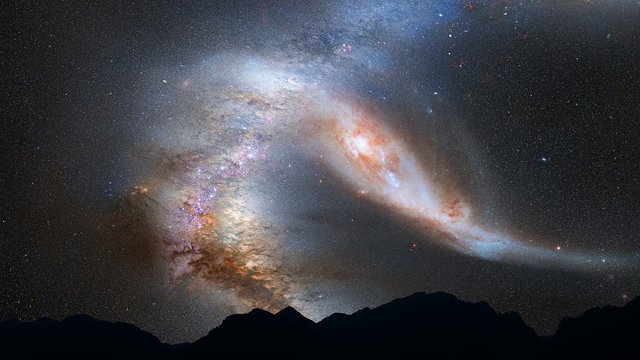Why are all elementary particles so unpredictable? Is there only one particle in the whole universe from which all other particles simply clone from creating a sequential flow through time? What about the anti particles?

I don't understand quantum mechanics vs classical physics. It seems that the physical universe becomes more predictable as the scales get larger and this could indicate something about the nature of what time really is. Determinism and logic seems to rely to my understanding of it, on a casual chain. Quantum mechanics is counter intuitive, and there is no obvious casual chain where you can predict with absolute accuracy where something is or exactly how any particle will act. Instead we have some sort of probability function with estimates on where we predict the behavior to be or do.
So if anyone knows quantum mechanics better than me please feel free to comment on this post. Why was Einstein right, and the universe is deterministic on the classical or large scale, but on the quantum scale somehow Einstein is wrong and the universe is unpredictable, maybe even timeless?
My question for physicists and quantum theorists:
Suppose we have a black hole? What would happen if you have a quantum entanglement where one side of the mirror particle is being pulled into the black hole beyond the event horizon but the other side is beyond the pull of the black hole?
How would the particle act if entangled with a black hole in some way?
I don't know why the big bang theory says that the universe is expanding faster than the speed of light either since it will counter the physics of nothing is faster than the speed of light, very weird.
Downvoting a post can decrease pending rewards and make it less visible. Common reasons:
Submit
The speed of light might be the speed of our universe, but there could be something beyond our very limited ability. Some estimate the actual universe is 1000 times bigger than the amount of universe we will ever be able to observe. In the future the universe which can be observed will shrink because of this expansion driving things apart.
Downvoting a post can decrease pending rewards and make it less visible. Common reasons:
Submit
To put it simple the universe is expanding faster than it can be perceived. The speed of light maps the speed of perception so it can never be perceived faster than light can reach.
Downvoting a post can decrease pending rewards and make it less visible. Common reasons:
Submit
Physicists are asking the the same question with different phrasing. How and when does quantum physics transition to classical physics, as modified by general relativity? Quantum gravity is part of this question. A lot may depend on the correct interpretation of quantum physics, if one can be found. Right now, interpretation is a matter of preference with little testability.
The universe becomes more deterministic at the quantum/classical transition, but not beyond it. At the largest scale, the cosmic background radiation has a lot of randomness. Statistics is required to tease out the structure.
Posted using Partiko Android
Downvoting a post can decrease pending rewards and make it less visible. Common reasons:
Submit
Is there any randomness in the background radiation? My understanding is by studying that pseudo-random looking background radiation we can answer all sorts of questions about the beginning of the universe and the ending of it. Am I wrong? How else are we able to make the accurate predictions about the end of the universe at the largest scales?
Downvoting a post can decrease pending rewards and make it less visible. Common reasons:
Submit
Yes. The CMB is grainy due to randomness. The patterns are not perfect because of it.
Posted using Partiko Android
Downvoting a post can decrease pending rewards and make it less visible. Common reasons:
Submit
Why are we able to find the smallest planck length of the universe and the universe doesn't expand smaller, but it does expand bigger? I don't understand why it only expands in one dimension and not all? Why isn't the universe expanding smaller and getting bigger?
Downvoting a post can decrease pending rewards and make it less visible. Common reasons:
Submit
The cause of the universe's expansion is under intense investigation by physicists and cosmologists. Recent episodes of PCS Space Time have been covering current theories. I highly recommend this YouTube series.
Posted using Partiko Android
Downvoting a post can decrease pending rewards and make it less visible. Common reasons:
Submit
In theory radioactive decay is a random process? I don't understand it but particles sometimes decay and sometimes don't, and do so at their own rates.
So maybe this is what you mean by randomness?
Downvoting a post can decrease pending rewards and make it less visible. Common reasons:
Submit
This is one aspect.
Posted using Partiko Android
Downvoting a post can decrease pending rewards and make it less visible. Common reasons:
Submit
That the "physical universe becomes more predictable as the scales get larger" is just an illusion. We just don´t have the instruments to look close enough at those small uncertainties. Since we ourselves are macroscopic by nature we don´t see / don´t care about the small uncertainties. As a result, on the macroscopic level the universe appears predictible.
Downvoting a post can decrease pending rewards and make it less visible. Common reasons:
Submit